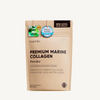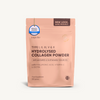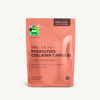We’ve all had that moment—catching our reflection in soft morning light and noticing a little more slackness around the jawline, a softening at the neck, or a fine line that lingers longer than it used to. It can feel like it crept up overnight, but the truth is, your skin has been quietly changing for years. And one of the key reasons? Collagen.
Collagen is the scaffolding of your skin. It gives your face that firm, lifted appearance you associate with youth. As we age, especially after 40, and particularly during perimenopause and menopause, collagen levels decline rapidly. That means less bounce, more creasing, and a subtle loss of definition around the contours of the face.
So, when should you start taking collagen for skin tightening? Is it ever too early or too late? Let’s explore what the science says, and how to make the smartest, most proactive choices for your skin.

What’s the Relationship Between Collagen & Skin Elasticity
Collagen isn’t just another skincare buzzword—it’s the most abundant protein in your body, and a key building block of your skin, bones, muscles, and connective tissues. Specifically, Type I and Type III collagen are responsible for your skin’s firmness, strength, and elasticity.
As part of your skin’s deeper structure—the dermis—collagen fibres act like the scaffolding beneath a canvas. They support your skin’s shape, help it “bounce back” when stretched, and keep it looking plump and smooth. But collagen is delicate. From around age 25, we begin to lose approximately 1% of our natural collagen each year (1)—and by the time we hit our 40s, that decline becomes far more pronounced.
The hormonal shifts of menopause, particularly the drop in oestrogen, further accelerate this loss. Research shows that women can lose up to 30% of their skin collagen in the first five years after menopause. That’s why the skin starts to sag, wrinkle, and lose its tone—not because we’re doing anything wrong, but because collagen production has slowed dramatically.
The Early Signs: When Collagen Starts to Run Out
Collagen production naturally begins to decline in our mid-20s, but things accelerate sharply after 40. A pivotal study (2) found that skin fibroblasts—the cells responsible for making collagen—produce about 30% less type I collagen in people aged 80+ compared to those in their 20s. More significantly, aged skin also has around 35% fewer fibroblasts, meaning the cells that do remain are fewer and less productive.
The result? A dramatic drop in your skin’s ability to replenish collagen. Combine that with hormonal shifts during menopause, and it’s easy to see why skin begins to thin, wrinkle, and lose its elasticity. Collagen not only becomes scarcer—it also grows more fragile, more disorganised, and less capable of providing the tensile strength your skin relies on. These changes don’t just affect appearance; they alter how skin feels—less firm, less supple, more prone to creping and sagging around the eyes, cheeks, and jawline.

When Should You Start Taking Collagen?
As we noted earlier, your body’s natural collagen production begins declining in your mid-to-late 20s, and the process accelerates in your 40s, particularly during menopause. A landmark study (3) found that fibroblasts in aged skin (80+ years) produce 30% less type I collagen than those in youthful skin (ages 18–29), and that the number of fibroblasts themselves decreases by about 35%. That means the skin's ability to repair and replenish itself is significantly impaired with age—leading to visible thinning, sagging, and reduced firmness.
Going even further, a 2023 meta-analysis (4) focused specifically on oral collagen’s anti-ageing effects in women, where participants experienced significant improvements in skin elasticity, hydration, and wrinkle reduction after daily collagen use.
What to Look for in a Collagen Supplement
Not all collagen supplements are the same. Some deliver real, visible results (firmer skin, improved elasticity, fewer wrinkles) while others do little more than sit on your shelf. The difference lies in the quality, bioavailability, and synergy of ingredients.
1. Hydrolysed Marine Collagen Peptides
The gold standard for skin health is hydrolysed collagen peptides, particularly those derived from marine sources. Hydrolysed collagen (also called collagen peptides) is broken down into smaller amino acid chains, which are easier for your body to absorb and use.
Marine collagen is especially potent because it's rich in Type I collagen—the same type that forms the bulk of your skin’s dermal structure. It’s also more bioavailable than bovine collagen, meaning it enters your bloodstream faster and begins supporting collagen regeneration more effectively.
2. Clinically Proven Doses
To see results, you need a therapeutic dose, not just a sprinkle. Look for products that provide at least 2.5 to 10 grams of collagen peptides per serving, a range supported by numerous clinical trials. Lesser doses may fall short of the benefits shown in research.
3. What to Expect: Results Over Time
Collagen doesn’t deliver overnight miracles—but with daily, consistent use, it can offer real, visible changes to your skin’s firmness, hydration, and elasticity.
-
Most clinical studies show that noticeable improvements begin to appear within 8 to 12 weeks. These changes occur as your body gradually builds up its collagen reserves.
-
By the three-month mark, many women also report a plumper, more luminous complexion, fewer fine lines around the eyes and mouth, and a softening of sagging around the jawline or neck.
-
Longer-term use—beyond 3 months—helps maintain these benefits and further supports overall skin resilience.
-
With continued supplementation, collagen also helps fortify nails, thicken hair, and improve joint comfort.

Final Thoughts
Supporting your skin as it changes with age doesn’t need to be complicated. A well-formulated collagen supplement, taken consistently, can help reinforce what your body is gradually producing less of and strengthen the foundation beneath your skin. You won’t be reversing time, but will maintain vitality and confidence as you move forward. Starting earlier can help slow visible signs of ageing, while beginning later can still offer meaningful improvements in texture, hydration, and elasticity. Whichever stage you’re at, giving your skin a little extra support now can pay off in how it looks and feels for years to come.
References for the blog
-
Reilly, D.M. and Lozano, J., 2021. Skin collagen through the lifestages: importance for skin health and beauty. Plastic and Aesthetic Research, 8, p.2. doi:10.20517/2347-9264.2020.153
-
Varani, J., Dame, M.K., Rittie, L., Fligiel, S.E.G., Kang, S., Fisher, G.J. and Voorhees, J.J., 2006. Decreased collagen production in chronologically aged skin: roles of age-dependent alteration in fibroblast function and defective mechanical stimulation. American Journal of Pathology, 168(6), pp.1861–1868. doi:10.2353/ajpath.2006.051302
-
Al-Atif, H., 2022. Collagen supplements for aging and wrinkles: a paradigm shift in the fields of dermatology and cosmetics. Dermatology Practical & Conceptual, 12(1), p.e2022018. doi:10.5826/dpc.1201a18
-
Pu, S.Y., Huang, Y.L., Pu, C.M., Kang, Y.N., Hoang, K.D., Chen, K.H. and Chen, C., 2023. Effects of oral collagen for skin anti-aging: a systematic review and meta-analysis. Nutrients, 15(9), p.2080. doi:10.3390/nu15092080








